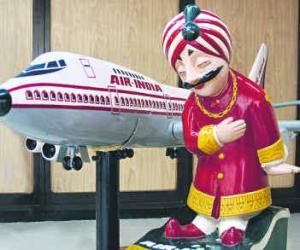 Government approved on Thursday Rs 800 crore (Rs 8 billion) equity infusion into the ailing Air India.
Government approved on Thursday Rs 800 crore (Rs 8 billion) equity infusion into the ailing Air India.
The spokesperson said the approval to release equity support in two equal monthly installments would have to be calibrated with the achievement of cost-reduction milestones laid down by the group of ministers.
The financial losses of National Aviation Company of India Limited have been compounded by weakening of its revenue stream, a high cost structure and costly legacy assets (obsolete assets) that have resulted in rising liabilities.
Following directions by the government, NACIL initiated a multi-pronged turnaround plan, which included rationalisation and redeployment of manpower and productivity linked incentive.
A roadmap for completion of the integration process of erstwhile Indian Airlines and Air India following their July 2007 merger is also part of the turnaround plan.
The airline also began the process of returning all its leased aircraft and review all agreements on technical and operational matters in a bid to slash costs.
It also decided to close down all overseas offices where Air India did not operate. After a presentation on these steps for financial restructuring, the GoM had accepted the company's savings and cost reduction plan of Rs 1,911 crore (Rs 19.11 billion) for the financial year 2009-10. The national carrier also initiated measures for fleet rationalisation and route profitability as part of its turnaround plan.
Air India plans to reduce its size from 146 aircraft to 105 by March 2011.
As many as 22 planes would be removed from the fleet by leasing or selling out and returning the leased planes.
It has been estimated that this would result in an annual cost savings of Rs 200 crore (Rs 2 billion) on maintenance and inventory and Rs 400 crore (Rs 4 billion) in fuel consumption and efficiency gains.
With the rationalisation future requirement for manpower for cockpit, cabin crew and engineers would also get reduced, leading to an estimated annual savings of Rs 300 crore (Rs 3 billion), its officials have said.
Another Rs 563 crore (Rs 5.63 billion) is estimated to be saved through route rationalisation measures.
The carrier has reworked its routes for the next Winter Schedule.
The savings are to made from restructuring of operations at Air India's new hub at Frankfurt, capacity adjustments and rationalising the overlap operations of erstwhile Indian Airlines and Air India Express.
Six jumbo Boeing 747s would be taken out and replaced, primarily by new Boeing 777s.
This would lead to reduction in fuel and other operational costs.
Air India has appointed Simat Helliesen & Eichner Inc. as consultants to focus on profitable hub operations and leverage efficiency from partners like the Delhi International Airport and the Star Alliance.
Manpower rationalisation (including staff-related costs) was also being attempted as an immediate, short-term and a long-term exercise, which is expected to result in annual savings of Rs 113 crore (Rs 1.13 billion), once implemented in full.





